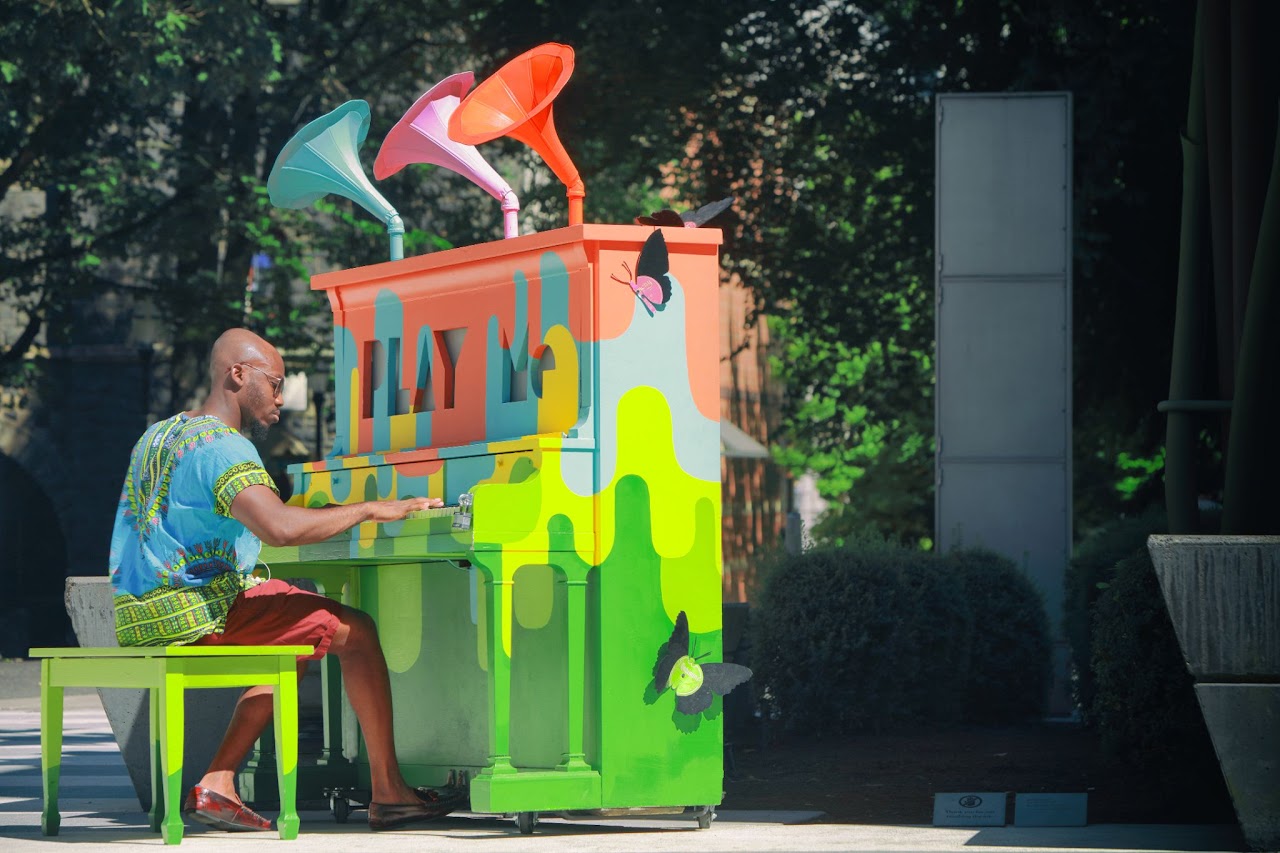Pretty painted pianos in Portland persuade people to play in public

If you see a brightly painted piano somewhere in a park or on the streets of Portland, chances are it’s part of a program called Piano.Push.Play. Ten pianos were put in public spaces intentionally. And the organization that put them there wants you to sit down and play.
According to its website, Piano.Push.Play. is on “a mission to make pianos available to anyone who wants to play them. We work with local piano companies to rescue old pianos that are still in great shape. Every summer, we put pianos out on the sidewalk and let anyone who wants to, enjoy the experience of making music. Experienced musicians and passersby alike help create music in a public space. When summer is over, we place those pianos in schools and community centers for everyone to play all year long.”
The organization receives piano donations from many places. The pianos are usually old, but they have to “hold a tune.” That means they have to still sound acceptable. They also have to survive on the streets. They will be outside in different kinds of weather. They will be played at all hours of the day.
The appearance of the donated pianos doesn’t matter because the organization invites artists to paint each one in their own unique style. There is only one rule: Each piano must display somewhere the phrase “Please play me.”
The organization also offers everyone an opportunity to have fun with music. You can play the pianos. You can listen to others play the piano. You can even get a “passport” from the organization. When you visit each piano around the city, you can stamp your passport with a stamper in the piano bench. (A map of piano locations is below.)
Megan McGeorge started the organization. She says, “I love changing people’s perspective. It’s what I enjoy most about running this project. People are used to seeing pianos looking a certain way, in a certain environment, played by a certain type of performer. What I can do by putting these pianos throughout the streets of Portland is allow people to see and experience each other differently. They also experience the city differently when these pianos are around. I think it’s pretty magical, and I know a lot of other folks that do as well.”
-This story was first published in ESOL News Oregon July 8, 2022.
Check
Discuss
- Many people take musical instrument lessons when they are children, but eventually quit. Was that true for you? What instrument did you play? For how long? Do you still remember how to play it? Would you like to take lessons again?
- What is the effect of music on people’s moods? Do you think that hearing piano music in the street can make a city a more pleasant place to be? Can it make people feel friendlier towards one another? Or do you think hearing piano music played by people who are not musicians would be annoying? Discuss!
- How does this project benefit the community? What barriers does it remove to playing the piano? How is it good for the environment?
- Try to think of some other objects that would be good to put outside and make available to the public. What would people be interested in exploring? What do people have in their houses right now that they don’t use very often and which could be of more use out on the street?
Write
- The title of this article, “Pretty painted pianos in Portland persuade people to play in public” uses a technique called alliteration, where the first letter of each word is the same. Try writing your own sentence with alliteration. Choose a letter, and then make sure each word in your sentence begins with that letter. You can write about anything you want! Next, try writing a sentence with alliteration about this article. You probably want to choose a letter other than “p” since your sentence must be different and written in your own words. If you are struggling, don’t worry; this just means you need to expand your vocabulary in English. The more words you have, the easier it will be. Have fun!
- What potential problems can you see with this project? Do you think people will mistreat the pianos? Do you think anyone will try to steal a piano? For a project like this to be successful, people must trust one another to do the right thing. Do you think the average person in Portland is capable of this? What about people in other cities? What about people in your hometown? Is there something special about Portland, or do you think this piano project could work anywhere in the world?
- You may have seen other sharing projects like little free libraries. People put out their books and encourage others to take them home or leave their own books. Does it feel strange to take something from someone you don’t know? How does it make you feel? Do you feel connected to this person even if you don’t know them? What does that connection do for society?
- The founder of the organization says she loves changing people’s perspectives. How do you think this project changes people’s perspectives about themselves, about other people, and about pianos? Compare our perspectives of how we normally see ourselves and others vs. how we see ourselves and others when we play the piano.
Sources
“Piano. Push. Play.” Piano. Push. Play., www.pianopushplay.com/. Accessed 6 July 2022.
Walker, Jerad. “After a Decade of Lowering Barriers to Art, Piano. Push. Play. Rolls On.” Opb, 26 June 2022, www.opb.org/article/2022/06/26/portland-oregon-piano-public-push-play-art-music/.
Image: Ian Sane via Flickr.

